-
 Bitcoin
Bitcoin $108,489.6704
1.13% -
 Ethereum
Ethereum $2,502.0528
2.92% -
 Tether USDt
Tether USDt $1.0002
0.00% -
 XRP
XRP $2.1941
0.51% -
 BNB
BNB $655.3375
1.00% -
 Solana
Solana $151.5977
1.27% -
 USDC
USDC $0.9999
0.00% -
 TRON
TRON $0.2768
0.32% -
 Dogecoin
Dogecoin $0.1676
2.86% -
 Cardano
Cardano $0.5675
0.98% -
 Hyperliquid
Hyperliquid $40.6109
7.48% -
 Bitcoin Cash
Bitcoin Cash $500.7746
2.09% -
 Sui
Sui $2.8328
2.03% -
 Chainlink
Chainlink $13.4452
1.26% -
 UNUS SED LEO
UNUS SED LEO $9.1623
0.39% -
 Avalanche
Avalanche $18.2267
2.24% -
 Stellar
Stellar $0.2382
0.00% -
 Toncoin
Toncoin $2.8885
1.68% -
 Shiba Inu
Shiba Inu $0.0...01159
0.91% -
 Litecoin
Litecoin $87.1827
0.88% -
 Hedera
Hedera $0.1511
2.90% -
 Monero
Monero $315.4992
-0.59% -
 Polkadot
Polkadot $3.4663
2.34% -
 Bitget Token
Bitget Token $4.6118
-0.65% -
 Dai
Dai $1.0000
-0.01% -
 Ethena USDe
Ethena USDe $1.0003
0.02% -
 Uniswap
Uniswap $7.2989
4.69% -
 Pepe
Pepe $0.0...01003
5.73% -
 Aave
Aave $275.5616
7.15% -
 Pi
Pi $0.5181
-2.49%
Is the golden cross above the zero axis of the MACD fast and slow lines a strong signal?
A golden cross above zero in the MACD signals strong bullish momentum, often confirming an ongoing uptrend in crypto markets.
Jun 30, 2025 at 10:49 am
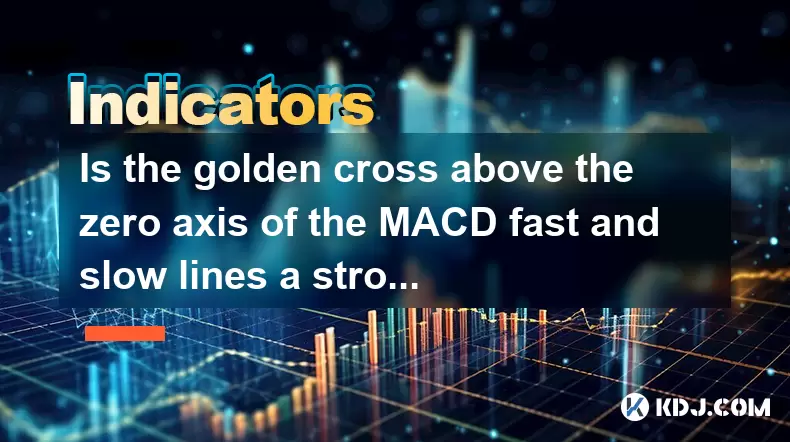
Understanding the MACD Indicator
The Moving Average Convergence Divergence (MACD) is a popular technical analysis tool used in cryptocurrency trading to identify potential trend reversals, momentum shifts, and entry or exit points. It consists of three main components: the MACD line, the signal line (slow line), and the histogram. The MACD line is calculated by subtracting the 26-period Exponential Moving Average (EMA) from the 12-period EMA. The signal line is typically a 9-period EMA of the MACD line.
In many trading platforms, the MACD is displayed as two lines oscillating around a zero axis. When the MACD line crosses above the signal line, it forms what is known as a golden cross. This event often draws attention from traders looking for bullish signals.
Golden cross refers to the situation where the fast line (MACD line) moves upward and crosses over the slower signal line. If this happens while both lines are positioned above the zero axis, some traders interpret it as a stronger confirmation of ongoing bullish momentum.
The Significance of the Zero Axis
The zero axis serves as a critical reference point in the MACD indicator. When the MACD line is above the zero axis, it indicates that the short-term average (12-period EMA) is higher than the long-term average (26-period EMA), suggesting positive momentum. Conversely, when the MACD line is below zero, it reflects negative momentum.
A golden cross above the zero axis implies that not only is there a bullish crossover happening, but the overall price environment is already favoring buyers. This can be interpreted as a continuation of an existing uptrend rather than a reversal. In crypto markets, which are highly volatile and sentiment-driven, such crossovers may carry more weight when they occur after sustained rallies or during strong market confidence.
How to Identify a Golden Cross Above Zero in MACD
To spot this pattern on your chart:
- Ensure you have the MACD indicator enabled on your charting platform (such as TradingView or Binance's native tools).
- Look for the fast line (usually colored blue or red depending on settings) crossing upwards over the slow line (typically yellow or orange).
- Confirm that both lines are located above the zero level at the time of the crossover.
- Check if the histogram bars are either shrinking or turning positive around the time of the cross.
This combination of conditions helps filter out weaker or misleading golden crosses that may appear during sideways or bearish phases.
Historical Performance in Cryptocurrency Markets
In cryptocurrency trading, especially with major coins like Bitcoin and Ethereum, the golden cross above zero has been observed during periods of strong momentum. For instance, during late 2020 and early 2021, several golden crosses occurred above the zero line as BTC rallied toward its all-time highs. These events were followed by continued upward movement, reinforcing their significance in real-world scenarios.
However, not every such cross leads to a significant move. There have been instances where false signals emerged — particularly during choppy or consolidating phases. Therefore, relying solely on this signal without additional context can lead to misinterpretation.
It’s also important to note that altcoins may behave differently compared to large-cap cryptocurrencies. Some smaller tokens may experience exaggerated MACD movements due to lower liquidity and higher volatility, making it essential to apply this signal selectively based on market conditions and asset type.
Combining the Signal with Other Tools
To increase the reliability of a golden cross above zero, traders often combine it with other indicators or price action techniques:
- Volume Analysis: A spike in trading volume around the crossover can confirm stronger buying interest.
- Price Action Confirmation: Look for bullish candlestick patterns such as engulfing candles or hammer formations near key support levels.
- Support and Resistance Levels: If the crossover occurs near a known demand zone or resistance breakout, it adds confluence to the trade setup.
- Other Indicators: Using RSI or Stochastic to check for overbought or oversold conditions can help avoid entering trades too late in the cycle.
These supplementary checks allow traders to filter out noise and focus on high-probability setups within the broader context of market structure.
Frequently Asked Questions
Q: Can a golden cross above zero still fail?
Yes, no technical signal is 100% accurate. False signals can occur, especially in ranging markets or during sudden news-driven volatility in crypto. Always use additional filters to confirm the strength of the signal.
Q: Is the golden cross above zero more reliable in certain timeframes?
Higher timeframes such as the 4-hour or daily charts tend to provide more reliable MACD signals. Lower timeframes can produce excessive noise, increasing the risk of premature entries.
Q: Should I enter immediately when the golden cross forms above zero?
Not necessarily. Waiting for confirmation through subsequent price action or a retest of support can improve timing and reduce the likelihood of being stopped out prematurely.
Q: What is the difference between a golden cross above zero and one below zero?
A golden cross below zero suggests a potential reversal from a downtrend to an uptrend. One above zero typically indicates a continuation of an existing bullish trend, which is generally seen as a stronger and more confident signal.
Disclaimer:info@kdj.com
The information provided is not trading advice. kdj.com does not assume any responsibility for any investments made based on the information provided in this article. Cryptocurrencies are highly volatile and it is highly recommended that you invest with caution after thorough research!
If you believe that the content used on this website infringes your copyright, please contact us immediately (info@kdj.com) and we will delete it promptly.
- Ripple, Stablecoin, Adoption: RLUSD Leading the Charge
- 2025-06-30 14:30:12
- Bitcoin ETF, IBIT, and the Bull Flag: Is $144,000 on the Horizon?
- 2025-06-30 14:50:12
- Bitcoin, Passive Income, and a Bull Raise: Riding the Crypto Wave
- 2025-06-30 14:30:12
- Bitcoin, Personal Loans, and Omega 88: A New Era in Lending?
- 2025-06-30 15:09:14
- Saylor's Strategy: How MicroStrategy's Bitcoin Bet is Reshaping Finance
- 2025-06-30 14:52:14
- Metaplanet's Bitcoin Blitz: From Zero to Hero in the Corporate Treasury Race
- 2025-06-30 15:10:54
Related knowledge
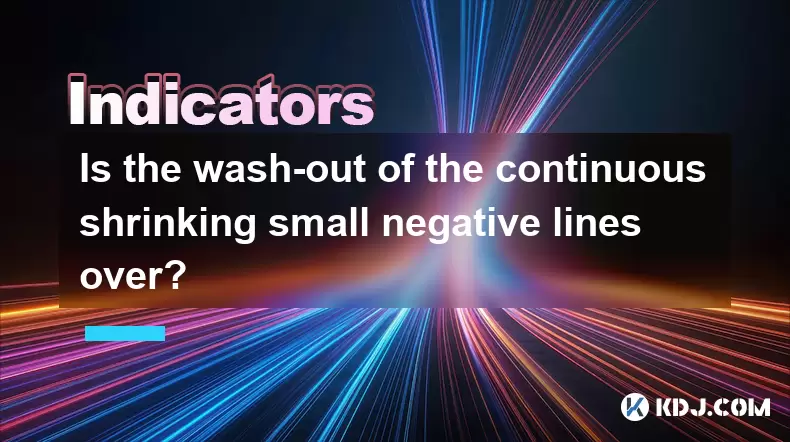
Is the wash-out of the continuous shrinking small negative lines over?
Jun 30,2025 at 12:21pm
Understanding the Concept of Wash-Out in Cryptocurrency MarketsIn cryptocurrency trading, a wash-out refers to a sharp price decline that forces weak-handed traders and investors to liquidate their positions. This often happens when a series of small negative candlesticks appear on the chart, indicating bearish sentiment without a significant breakout. ...
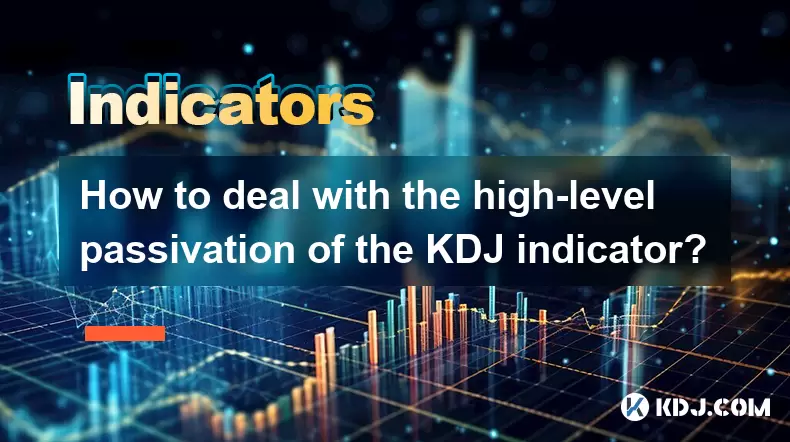
How to deal with the high-level passivation of the KDJ indicator?
Jun 30,2025 at 02:14pm
Understanding the KDJ Indicator and Its Role in Cryptocurrency TradingThe KDJ indicator, also known as the stochastic oscillator with J line modification, is a momentum-based technical analysis tool widely used in cryptocurrency trading. It consists of three lines: K, D, and J, which reflect overbought and oversold conditions. Traders often rely on it t...
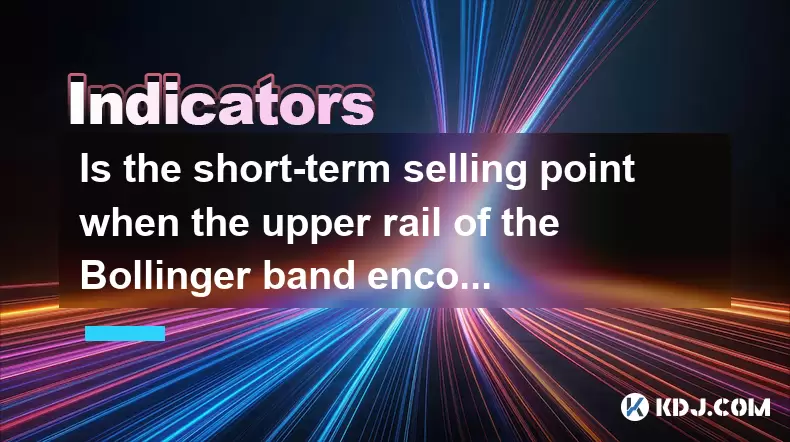
Is the short-term selling point when the upper rail of the Bollinger band encounters resistance and falls back?
Jun 30,2025 at 03:29pm
Understanding Bollinger Bands and Their Role in TradingBollinger Bands are one of the most widely used technical indicators in cryptocurrency trading. They consist of three lines: a simple moving average (SMA) in the middle, typically set to 20 periods, and two outer bands that are standard deviations away from the SMA—usually set at 2 standard deviatio...
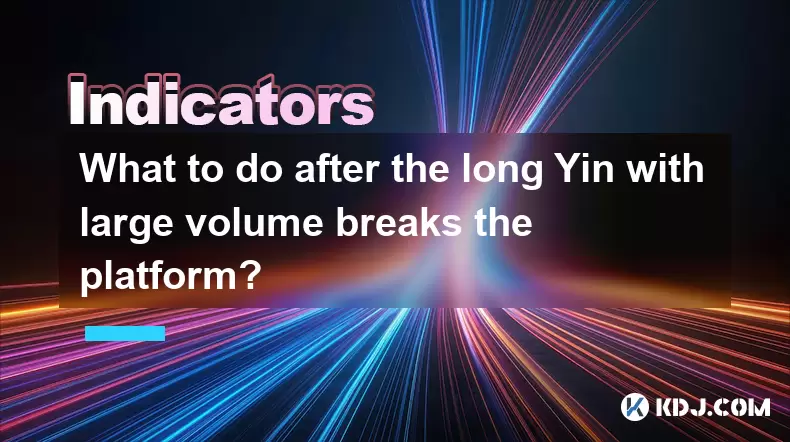
What to do after the long Yin with large volume breaks the platform?
Jun 30,2025 at 03:07pm
Understanding the Long Yin with Large Volume PatternA long Yin refers to a candlestick pattern where the price opens higher but closes significantly lower, forming a long red (or bearish) candle. When this occurs alongside large trading volume, it signals strong selling pressure and a potential shift in market sentiment. If this pattern breaks a previou...
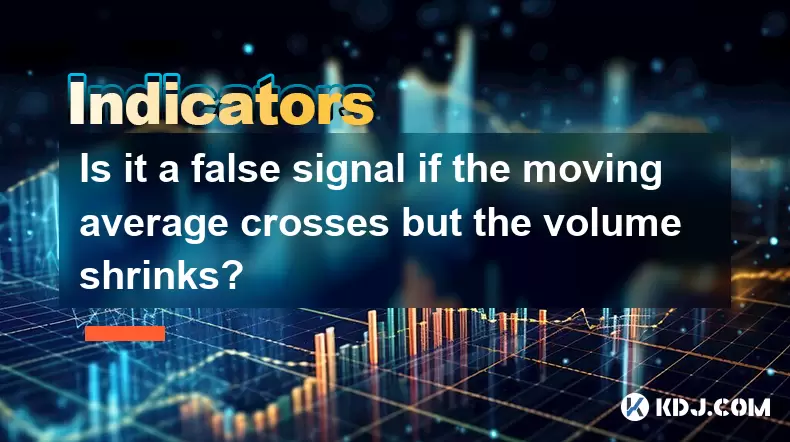
Is it a false signal if the moving average crosses but the volume shrinks?
Jun 30,2025 at 03:21pm
Understanding Moving Average CrossoversA moving average crossover is one of the most commonly used technical indicators in cryptocurrency trading. It involves plotting two moving averages — typically a short-term (e.g., 9-day) and a long-term (e.g., 21-day) — on a price chart. When the shorter-term moving average crosses above the longer-term one, it's ...
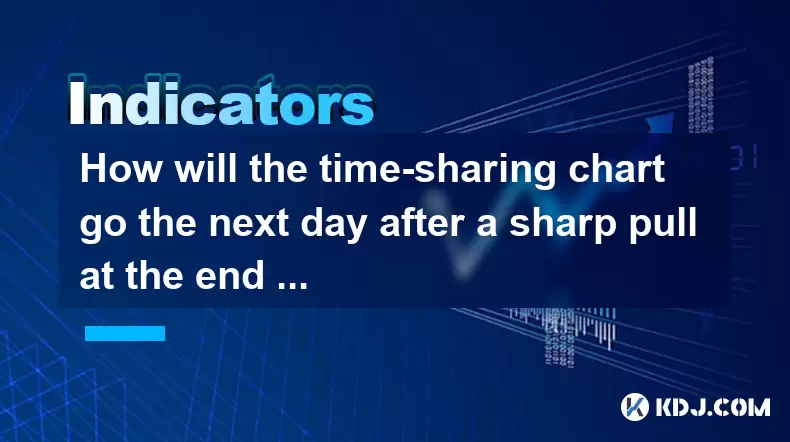
How will the time-sharing chart go the next day after a sharp pull at the end of the trading day?
Jun 30,2025 at 02:35pm
Understanding the Time-Sharing Chart and Its RelevanceThe time-sharing chart is a crucial tool used by traders in cryptocurrency markets to track real-time price movements of an asset throughout the trading day. Unlike traditional candlestick charts, which show aggregated data over fixed time intervals (e.g., 1-hour or 4-hour), the time-sharing chart di...

Is the wash-out of the continuous shrinking small negative lines over?
Jun 30,2025 at 12:21pm
Understanding the Concept of Wash-Out in Cryptocurrency MarketsIn cryptocurrency trading, a wash-out refers to a sharp price decline that forces weak-handed traders and investors to liquidate their positions. This often happens when a series of small negative candlesticks appear on the chart, indicating bearish sentiment without a significant breakout. ...

How to deal with the high-level passivation of the KDJ indicator?
Jun 30,2025 at 02:14pm
Understanding the KDJ Indicator and Its Role in Cryptocurrency TradingThe KDJ indicator, also known as the stochastic oscillator with J line modification, is a momentum-based technical analysis tool widely used in cryptocurrency trading. It consists of three lines: K, D, and J, which reflect overbought and oversold conditions. Traders often rely on it t...

Is the short-term selling point when the upper rail of the Bollinger band encounters resistance and falls back?
Jun 30,2025 at 03:29pm
Understanding Bollinger Bands and Their Role in TradingBollinger Bands are one of the most widely used technical indicators in cryptocurrency trading. They consist of three lines: a simple moving average (SMA) in the middle, typically set to 20 periods, and two outer bands that are standard deviations away from the SMA—usually set at 2 standard deviatio...

What to do after the long Yin with large volume breaks the platform?
Jun 30,2025 at 03:07pm
Understanding the Long Yin with Large Volume PatternA long Yin refers to a candlestick pattern where the price opens higher but closes significantly lower, forming a long red (or bearish) candle. When this occurs alongside large trading volume, it signals strong selling pressure and a potential shift in market sentiment. If this pattern breaks a previou...

Is it a false signal if the moving average crosses but the volume shrinks?
Jun 30,2025 at 03:21pm
Understanding Moving Average CrossoversA moving average crossover is one of the most commonly used technical indicators in cryptocurrency trading. It involves plotting two moving averages — typically a short-term (e.g., 9-day) and a long-term (e.g., 21-day) — on a price chart. When the shorter-term moving average crosses above the longer-term one, it's ...

How will the time-sharing chart go the next day after a sharp pull at the end of the trading day?
Jun 30,2025 at 02:35pm
Understanding the Time-Sharing Chart and Its RelevanceThe time-sharing chart is a crucial tool used by traders in cryptocurrency markets to track real-time price movements of an asset throughout the trading day. Unlike traditional candlestick charts, which show aggregated data over fixed time intervals (e.g., 1-hour or 4-hour), the time-sharing chart di...
See all articles

























































































